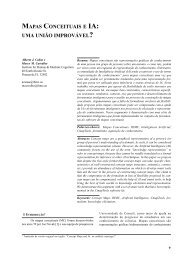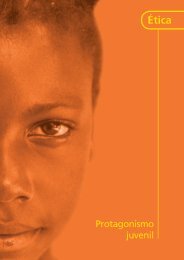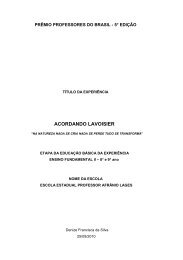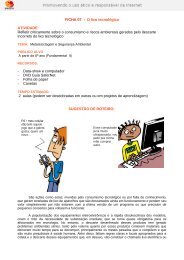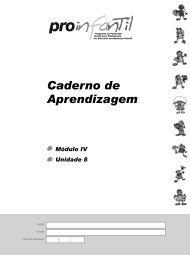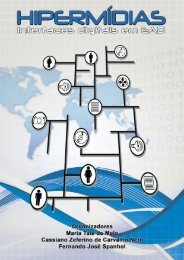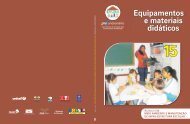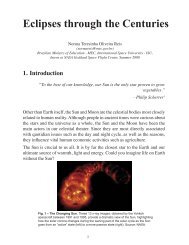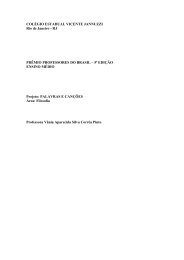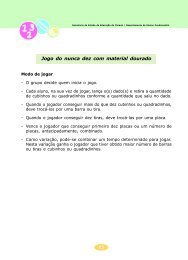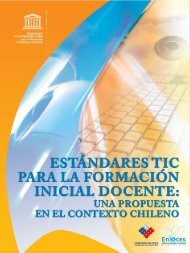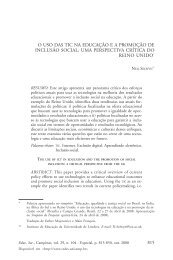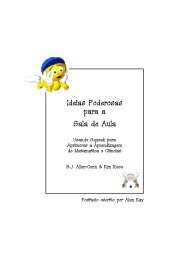BIO-CULTURAL COMMUNITY PROTOCOLS - Portal do Professor
BIO-CULTURAL COMMUNITY PROTOCOLS - Portal do Professor
BIO-CULTURAL COMMUNITY PROTOCOLS - Portal do Professor
Create successful ePaper yourself
Turn your PDF publications into a flip-book with our unique Google optimized e-Paper software.
APPENDIX RAIKA <strong>BIO</strong>-<strong>CULTURAL</strong> PROTOCOL<br />
OUR RIGHTS UNDER INDIAN LAWS & POLICIES<br />
A. The Biological Diversity Act of 2002 and<br />
the Biological Diversity Rules of 2004<br />
The Biological Diversity Act of 2002 in its efforts to fulfil India's<br />
commitments under the Convention on Biological Diversity<br />
provides for the conservation of biological diversity,<br />
sustainable use of its components and the fair and equitable<br />
sharing of benefits arising from the use of such biological<br />
diversity and associated traditional knowledge (TK).<br />
The Biological Diversity Act sets up the National Biodiversity<br />
Authority (NBA) and the Biological Diversity Rules of 2004<br />
lists the functions of the NBA as including regulating<br />
access to biological resources and associated TK for<br />
commercial and research purposes. The NBA is also<br />
empowered to advise the Central Government on any<br />
matter relating to the conservation and sustainable use<br />
of biodiversity and associated TK and the fair and equitable<br />
sharing of benefits arising from the utilization of biological<br />
resources and associated TK. The Biological Diversity Act<br />
among other things requires the Central Government under<br />
Section 36 to promote the conservation and sustainable use<br />
of biological diversity through in situ conservation and<br />
minimize the adverse effects on biological diversity of any<br />
project undertaken through environmental impact<br />
assessments that includes public participation. The Central<br />
Government is tasked with ensuring respect and protection<br />
of associated TK of local communities in accordance with<br />
the recommendations of the NBA including registration of<br />
TK and other sui generis methods for its protection.<br />
Under Sec 38 the Central Government is also required to<br />
preserve and protect those species that are on the<br />
verge of extinction.<br />
In order to ensure the effective fulfilment of the role of the<br />
NBA at a local level, local bodies such as the Panchayats or<br />
Municipalities are required under Sec 41 to set up Biodiversity<br />
Management Committees (BMCs) to promote conservation<br />
and sustainable use and <strong>do</strong>cumentation of biological diversity<br />
and associated TK. The NBA and the State Biodiversity Boards<br />
would consult with the BMCs while taking any decision<br />
relating to the use of biological resources and associated TK<br />
within the territorial jurisdiction of the BMC. Under Rule 22<br />
(6) of the Biological Diversity Rules of 2004 the main function<br />
of the BMC is to prepare a Peoples Biodiversity Register in<br />
consultation with the local people which shall contain<br />
comprehensive information on availability and knowledge<br />
of local biological resources and their associated TK.<br />
The Biological Diversity Act under Sec 21 envisages that the<br />
NBA will base its approval regarding any application for<br />
access to biological resources or associated TK on the whether<br />
a mutually agreed terms and fair and equitable benefit<br />
sharing has been negotiated with the local community that<br />
provides such resource or associated TK (benefit claimers<br />
according to Sec 2 (a) of the Biological Diversity Act).<br />
The local community or benefit claimers in question will be<br />
identified according to the Peoples Biodiversity Register<br />
under the territorial jurisdiction of the local BMC.<br />
The Biological Diversity Act and Rules therefore provides<br />
certain rights to the Raika community:<br />
• The right to consultation and public participation prior<br />
to any project that may affect the livelihoods of Raika,<br />
their animal breeds and associated TK;<br />
• The right to conservation and sustainable use of our<br />
animal breeds;<br />
• The right to give prior informed consent and negotiate<br />
mutually agreed terms when any Raika animal genetic<br />
resources or associated TK is accessed and share fairly<br />
and equitable in any benefits arising from the utilization<br />
of their animal genetic resources and associated TK;<br />
• The right to a Peoples Biodiversity Register that will<br />
<strong>do</strong>cument Raika biological diversity and associated TK;<br />
• The right to a BMC to advise the NBA on how the Raika<br />
biological resources and associated TK can be conserved<br />
and sustainably used; and<br />
• The right to carry on the Raika traditional lifestyles which<br />
involves continued access to grazing lands in order to<br />
conserve the biological diversity of our breeds<br />
and associated TK.<br />
81



